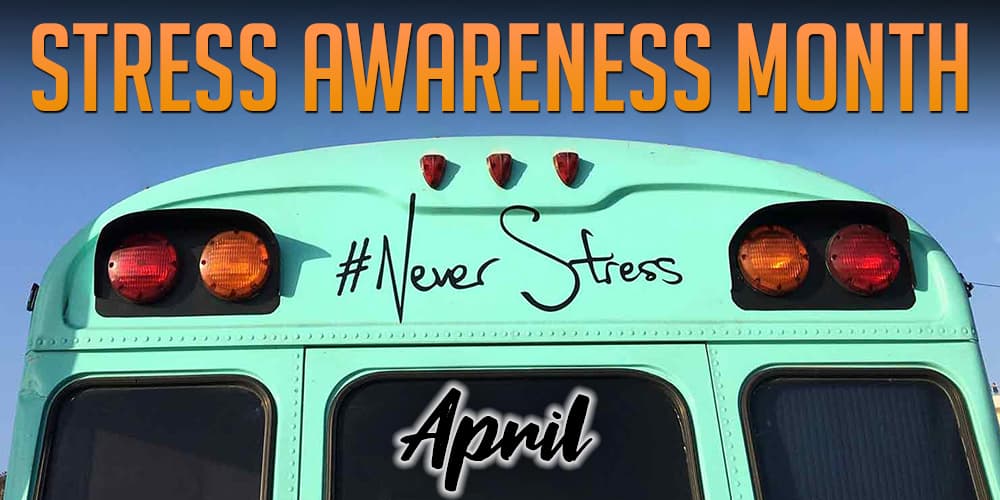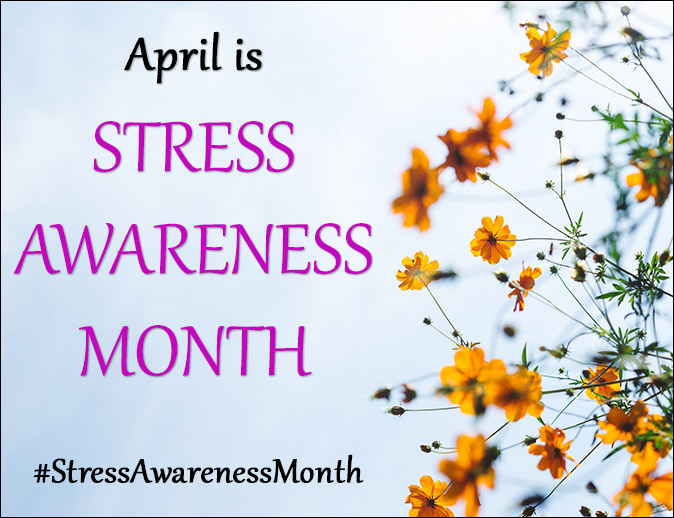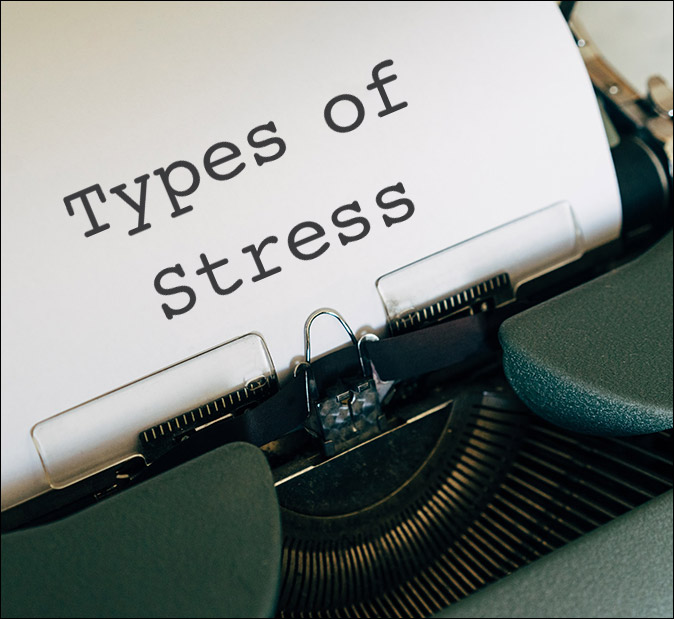
April is Stress Awareness Month and it’s a good time for all of us to learn how to effectively handle the different types of stress in our everyday life.
Dealing with endless to-do lists and stressful school or work situations can be difficult to handle sometimes. Not to mention finding enough time for family responsibilities on top of everything else.
Different types of stress can be caused by many factors, and sometimes it can be a positive thing to keep us safe or help provide extra focus for looming deadlines.
On the other hand, stress is also one of the biggest public health concerns of our time.
Not only does stress impact mental health issues like anxiety and depression, but it is also linked to immune disorders, heart disease, and digestive problems.
A whopping 94 percent of Americans report stress in the workplace, with the most stressed age group being 30 to 49-year-olds, according to Wrike collaborative work management.
What’s more, a substantial 91 percent of Gen Z adults say they have experienced at least one or more physical or emotional symptoms due to stress, as reported by the American Psychological Association.
Stress Awareness Month offers an opportunity to learn what causes different types of stress, and the importance of reducing it for our self and others.

Recognizing April as Stress Awareness Month
Stress Awareness Month has been recognized since 1992. April is a time to raise awareness of the effects that stress has on our life and help others to learn how to de-stress.
The first step towards releasing stress is understanding what causes it and then recognizing it when it rears its ugly head in our life.
Stress Awareness Month gives us the chance to focus on the facts surrounding stress, as well as offering us an opportunity to learn healthy coping mechanisms to reduce its effects.
What is the Definition of Stress?
Stress is defined as a physical, mental, or emotional reaction that causes tension in the mind or body due to internal or external forces.
In other words, stress is a feeling that is experienced when our demands exceed our personal and social resources in the form of physical, mental, or emotional strain or tension.
Fortunately, is isn’t always harmful. Some types of stress, like exercising, or an achievable timeline are healthy forms of stress. These good types of stress are known as “eustress.”
As many as 57 percent of stressed-out people feel paralyzed, while 43 percent state that it invigorates them.
Physically speaking, stress occurs when the Parasympathetic Nervous System (PNS) is activated. This is also known as the fight-or-flight response.
It develops when the body is flooded with the hormones of action – adrenaline, cortisol, and norepinephrine.
If a person is in a stressed (fight or flight) state of mind, brain responses are dulled and the brakes are applied to the digestive system.
When this happens, too much cortisol can raise blood sugar levels, which may lead to metabolic syndrome or pre-diabetes. Prolonged chronic stress can wreak havoc on the body.
Learn More: Burnout is Now Officially Classified as a Mental Illness

What are the Different Types of Stress?
There are many ways to look at the different types of stress.
Physical Stress occurs when the body is maxed out due to physical activities such as sports, a long day of travel, or simply being on your feet for an entire day.
Emotional Stress is what most people consider stress, and it is also the most common form. This can appear as a result of issues at work, school, relationships, financial problems, or other traumatic events.
Stress can also be Acute or Chronic.
Acute Stress is the most common type and is a trigger response to a stressful event, whereas Chronic Stress arises when acute stress isn’t fully resolved and continues for an extended period of time.
In addition, stress can be grouped into 4 different categories when examining ways to reduce it, as described by Dr. Karl Albrecht in his book, Stress and the Manager.
Karl Albrecht’s 4 Types of Stress
1. Time Stress
Time stress happens when we worry about time, such as having too many things to do in a given time period, or being late to work or a meeting.
2. Anticipatory Stress
Anticipatory stress deals with stress about future events like a wedding, graduation, or giving a presentation for work or school.
3. Situational Stress
Situational stress occurs when we experience an event that causes emotional turmoil such as a car accident, or making a mistake while playing sports that causes our team to lose the game.
4. Encounter Stress
Encounter stress is focused on upsetting encounters we have with other people like rude customers at work, or a bully at school.
Emotional Types of Stress (Brain Fog, Worry, and Perfectionism)
When in a state of stress, we have three choices at our disposal – fight, flight, or freeze.
To release emotional stress it’s essential to move, go for a walk, or stretch our legs. Deep diaphragmatic breathing or meditation can also help.
It’s important to avoid making important decisions at this time, because when we’re stressed, our brain doesn’t function properly.
Causes of emotional stress often include fear and uncertainty, usually from projects or outside influences, like the news.
How we view the world can also impact our ability to deal with stressful situations. If we worry that we are not good enough at work or in a relationship, these factors can impact our levels of stress.
Another form of emotional stress can emerge from having unrealistic expectations, also known as perfectionism.
Nobody is perfect and we shouldn’t expect to succeed at everything all the time, so it’s important to give yourself some slack and accept things the way they are sometimes.

10 Healthy Ways to De-Stress for Stress Awareness Month
During stress awareness month, learn to put yourself first and set up a healthy lifestyle routine that breaks the cycle of stress in your life.
Here are 10 Ways to De-Stress During Stress Awareness Month
- Set healthy boundaries
- Drink 8 glasses of water per day
- Eat a nutritious diet of whole foods and fresh fruits and vegetables
- Put your health above all else through self care
- Create a healthy sleep routine
- Learn diaphragmatic breathing or meditation
- Exercise daily
- Practice gratitude or make a Gratitude Jar
- Switch off your devices so you can unplug and unwind
- Make a daily plan to avoid being overwhelmed
Related: Low Stress Jobs for People with Anxiety
4 Things to Do For Stress Awareness Month
The first thing you can do for stress awareness month is to take care of the stress in your own life.
Here are 4 things that can reduce the amount of stress in your life:
1. Practice Self Care
Making time each day to do things you enjoy is critical for your overall health. If you’re feeling stressed or anxious, take time out to relax. Self-care is often thought of as being indulgent, but it’s quite the opposite.
If you’re stressed all the time, you can’t be your best for others. Looking out for yourself is one of the most important things you can do in life.
2. Talk Openly About Stress
Talking openly about your stories of stress that may help others open up too. This can also help you relax.
Very often we build things up in our head that don’t actually exist, so when we talk about our problems, they can be more easily resolved.
3. Share Successful Tips About Stress
Let other people know about healthy coping mechanisms that have actually worked well for you.
Teaching is one of the best ways to learn, and by sharing how you deal with stress, it not only helps others, but it can also help you can make the best choices in the future.
4. Be Compassionate With Yourself and Others
When others are feeling stressed they may seem a bit off, or rude. Instead of meeting their frustration with a knee jerk reaction, show them empathy.
The Golden Rule applies here and imagining how you’d like to be treated if you were feeling stressed out is an ideal way of finding the grace to show compassion and empathy for others who are stressed out as well.
Learn More: Is There a Relationship to Alcohol and Anxiety?
How Can You Promote Stress Awareness Month in April?
If stress has impacted your life, yet you’ve found ways to cope with it, April is the perfect time to share what works for you with others, and spread awareness about the effects of stress.
Here are some ways to get involved:
- Use the hashtag #StressAwarenessMonth on your social media channels to share coping mechanisms and stories about how you overcome stress
- Create a video with tips for others
- Organize a local event
- Write an article for your local newspaper
- Gather personal stories about stress and share them on your blog or website
The Bottom Line on Stress
There’s simply no way to avoid stress. But setting up healthy boundaries and habits while practicing self-care can go a long way to reducing the impact of stress in your life.
When setting boundaries, stick to a plan that is focused on your own health and wellbeing. Take time out of your daily schedule to exercise and also do something that you really enjoy.
Then share how this impacts your life with others to create a ripple effect to reduce the impact of stress for everyone during stress awareness month.
Related Posts
- Stressed Out? What are Stress vs Anxiety Symptoms
Are you stressed out not knowing wether you're suffering from Anxiety or Stress? Though they…
- Jobs for People with Anxiety - Low Stress Jobs
Some of the best jobs for people with anxiety are low stress jobs that involve…
- A Month of Awareness: National Recovery Month + Suicide Prevention Month
September is National Recovery Month and National Suicide Prevention Month to create awareness about each…
